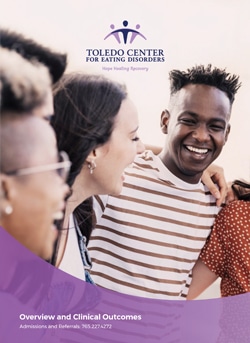Ready to take the next step in achieving freedom from your eating disorder?
What Makes Toledo Center Different?
Individualized Treatment
We believe everyone’s eating disorder and life experience are unique, so we provide customized treatment for each client. Our tailored treatment plans will ensure that your loved one’s specific needs are met. We will partner with you and your loved one to provide ongoing guidance and assessment as they navigate their recovery journey.Comprehensive Care
Eating disorders and co-occurring mental health disorders are complex and require comprehensive treatment. At Toledo Center, we don’t just focus on the presenting condition, but rather on the underlying disorders by utilizing a comprehensive whole-person approach that serves as the foundation for true client-centered care.Expert Team
Our staff is highly trained and dedicated to providing the highest quality treatment based on the latest evidence-based and clinical practices. Our team includes psychiatrists, family practice physicians, registered nurses, dietitians, master’s level therapists, licensed social workers, educators, and specially trained residential staff.What Our Alumni Are Saying
I’ve stayed here twice, once in 2017 when it was River Center Clinic and once in 2019 after it became the Toledo Center; and I would go back if I needed inpatient again. The therapists are all experienced and empathetic. The facility is in a cute area. The backyard looks like you’re in a metro park; I spent a lot of time sitting next to the creek journaling and doing yoga. If there was anything I think they could do better, it’d be that when I was last there in late 2019, they were switching from a calorie-based to intuitive eating meal system; there were some growing pains, although I assume almost a year later, they’ve got the kinks worked out. One other cool thing is for people who live nearby you get to do home visits and practice the skills you’ve been learning while you still have the structure of the program.

It’s difficult to fully explain the tremendous impact that Toledo Center has had on my life. When I entered the clinic, I was angry, afraid, and hopeless. I could hardly imagine a life without an eating disorder, and I wasn’t sure that I wanted to. But the staff at the clinic both supported and challenged me in ways that taught me that there’s much more to life than having an eating disorder. I also found it reassuring that the program is based on data obtained over many years of research and clinical work. By the time I left the clinic I had hope, and felt truly supported, for the first time in a very long time. I was also able to return home with an evidence-based program to guide me outside of treatment. I am so grateful for the incredible and caring staff at the clinic and for my time there.


Toledo Center Outpaces National Clinical Benchmarks
What We Treat and How
What We Treat
- Anorexia Nervosa
- Avoidant/Restrictive Food Intake Disorder (ARFID)
- Binge Eating Disorder
- Bulimia Nervosa
- Compulsive exercise
- Purging disorder
- Co-occurring Mental Health Disorders
Our Therapies
- Acceptance and Commitment Therapy (ACT)
- Cognitive Behavioral Therapy (CBT)
- Dialectical Behavior Therapy (DBT)
- Experiential Therapy
- Exposure and Response Prevention (ERP)
- Family Therapy
- Individual Psychotherapy Sessions
- Internal Family Systems
- Mindfulness
- Motivational Interviewing
- Narrative Therapy
- Nutrition Therapy
- Psychodynamic Therapy
Levels of Care
Adolescent Residential Treatment (RTC)
Offering a high level of intensity, structure, safety, and monitoring for adolescents of all genders (ages 12-17), our RTC program provides a comfortable living area with shared rooms and a common living space where clients receive care 24 hours a day, seven days a week.
Adolescent Partial Hospitalization Program (PHP)
Our PHP provides evidence-based treatment balanced with activities aimed at enhancing mindfulness, encouraging healing, and helping with the development of new modes of self-expression.
An Unmatched Holistic Treatment Approach

Specializing in Enhanced Cognitive Behavioral Therapy (CBT)

Guiding Your Loved One On Their Recovery Journey

Providing A Safe, Home-like Setting
Taking the Next Step
[contact-form-7 id=”6″]
